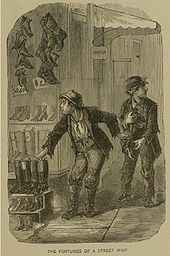theft
Theft is against foreign ownership -related offense . Which behavior constitutes theft in a specific individual case is determined by the criteria of the respective national criminal law norm, such as Section 242 in the Criminal Code (Germany) on theft under German law or Section 127 Criminal Code (Austria) on theft under Austrian law .
In the past three decades, the number of reported thefts in Germany has more than halved. This decline follows the trend that can be observed in all western countries.
etymology
The German colloquial verb steal for stealing is from the old and now preserved even in the dialects importance with the claw grip, grab, scratch, krauen, crawl into ahd. Klāwen, klouwen (9th century), MHG. Klöuwen frühnhd. clue, small . Grabbing with the claws and grasping developed into dialect stealing in the 19th century at the earliest , to which the casually used noun Klau for theft can also be traced back. The word theft is also used colloquially , especially in Austria.
Legal situation in individual countries
- Germany: Theft (Germany)
- England and Wales: Theft (England and Wales)
- France: Theft (France)
- Austria: Theft (Austria)
- Russia: Theft (Russia)
- Switzerland: Theft (Switzerland)
Distinction
Depending on the location and type, there are differences in the execution and countermeasures.
- Theft of intercourse : in the temporal and factual context of sexual intercourse
- Bicycle theft : Bicycles are often in public places
- Shoplifting : unpaid removal of goods
- Mouth robbery : embezzlement of daily necessities in small amounts or insignificant value for immediate consumption
- Schwänzelpfennig : embezzlement of a small amount
- Robbery involves the use or threat of violence
- Pickpocketing : Street crime in which the pickpocket is in the direct sphere of influence of another person
- Trick theft : the victim is distracted by various measures
Cultural history
A cultural history of theft and the mythical and literary figure of the thief was written by the cultural scientist Andreas Gehrlach.
Crime statistics

The Federal Criminal Police Office annually publishes statistics on all criminal offenses reported in Germany, the police crime statistics . For three decades the numbers there have been falling sharply. In 1993 there were still 5,126 cases per 100,000 population. In 2019 there were less than half as many at 2,194. This means that the theft crime area has declined even more than overall crime, which has only fallen by 21%.
The pattern of a decrease in the incidence of theft since the early 1990s can be found in all Western countries. It's part of an overall decline in crime .
| offense | cases | Change (2017 to 2018) Change in the number of cases |
Change to the previous year | Clearance rate |
|---|---|---|---|---|
| Total theft | 1,936,315 | -156,679 | -7.5% | 11.6% |
| Pickpocketing | 104.196 | -23,180 | -18.7% | 5.7% |
| Bicycle theft | 292.015 | -32,480 | -2.7% | 9.1% |
| Theft from automobiles |
247.311 | -29,617 | -10.7% | 10.2% |
| Home burglary | 97.504 | -19.036 | -16.5% | 18.1% |
| Theft of motor vehicles | 30,232 | -3,031 | -9.1% | 11.9% |
Web links
Individual evidence
- ↑ a b c d Police crime statistics. Federal Criminal Police Office, accessed on March 30, 2020 .
- ↑ a b Michael Tonry: Why Crime Rates Are Falling Throughout the Western World, 43 Crime & Just. 1 (2014). P. 5 , accessed on June 6, 2019 (English).
- ↑ steal. In: Digital dictionary of the German language . Retrieved August 30, 2014
- ↑ steal , in duden.de, accessed on August 30, 2014
- ↑ Klau, der , duden.de, accessed on August 30, 2014
- ↑ deutsche-anwaltshotline.de accessed on March 2, 2019
- ↑ jusline.at accessed on March 2, 2019


